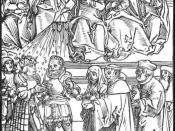Political philosophy is the philosophy of the state. A state is a group of people who have supreme authority within a given territory or over a certain population, according to Wolf. Authority then, is the right to command and the right to be obeyed which is different from power. Power in Wolff's terms, is the "ability to compel compliance." Moral autonomy is "a submission to laws which one has made for oneself." Wolf believes that there is a problem between authority and autonomy. Autonomy overrides the importance of authority. He also thinks that classical democracy fails to be a solution to this problem.
An autonomous person is not subject to the will of another. This is thought to be the primary obligation of man. In political philosophy, autonomy is a refusal to be ruled, and authority of the state is the right to rule, there is a conflict. If a man fulfills his obligation to autonomy, then he will go against the claim by the state to have authority over him.
Wolf states, "He will deny that he has a duty to obey the laws of the state simply because they are the laws." This is the major conflict with political authority. Some philosophers believe that a solution to this problem is the concept of democracy.
This argument says that if men rule themselves then they would be both the law givers and followers, combining autonomy with authority. "His obligation to submit to the laws stems not from the divine right of the monarch, nor from the hereditary authority of a noble class, but from the fact that he himself is the source of the laws which govern him."
Wolf doesn't think that it fully solves the problem between authority and autonomy. A unanimous direct democracy...


